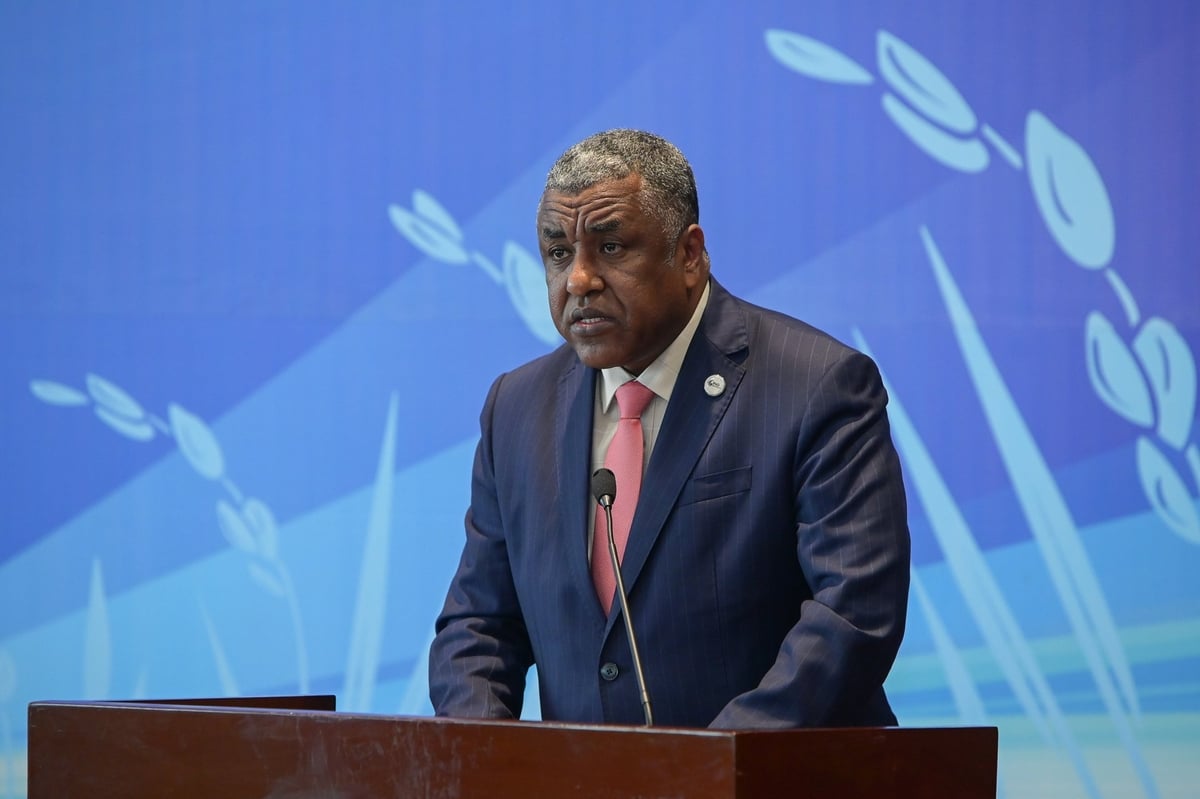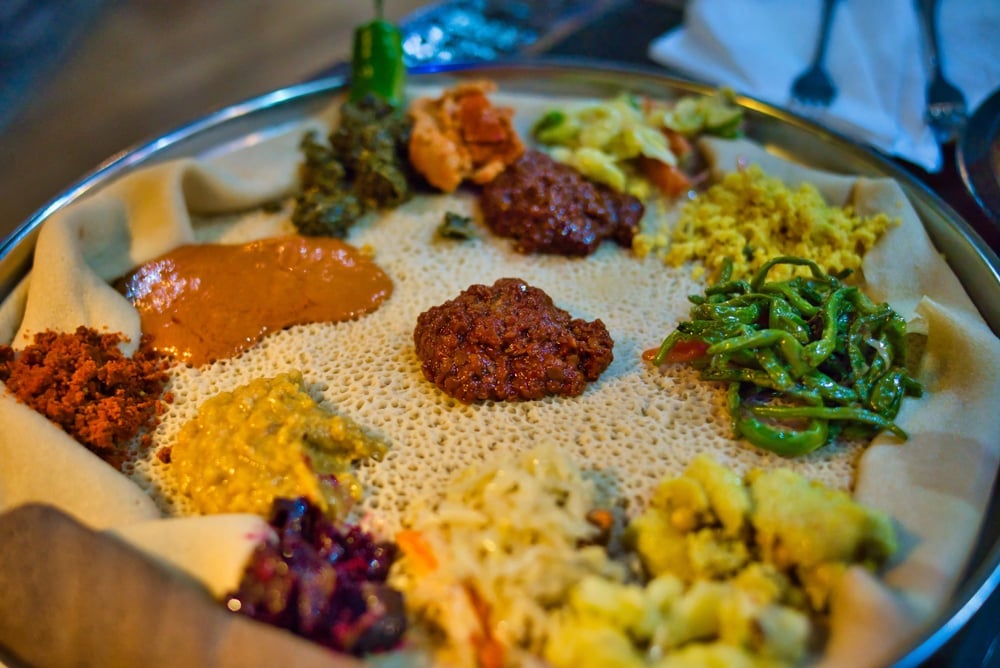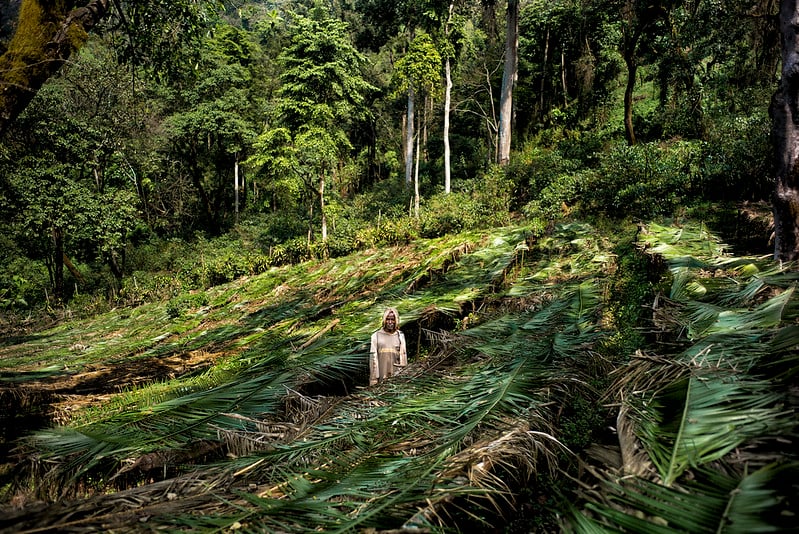December 8, 2025 | 15:24 GMT +7
December 8, 2025 | 15:24 GMT +7
Hotline: 0913.378.918
December 8, 2025 | 15:24 GMT +7
Hotline: 0913.378.918

Dr. Girma Amente - Minister of Agriculture of Ethiopia - shares the journey of national food production self-sufficiency. Photo: Tung Dinh.
On April 17, Vietnam's Minister of Agriculture and Environment Do Duc Duy chaired a ministerial session titled "Riding with the Green Revolution 4.0: The Journey of Transforming the Food System for a Sustainable Era" within the framework of the P4G Summit.
Ethiopia has assumed the responsibility of hosting the 5th edition of the biennial P4G Summit in 2027. Therefore, Minister Amente's participation in the discussion showcased a commitment to extend the dialogue on food systems from Vietnam to Ethiopia.
As a panelist in the discussion, Dr. Girma Amente, Minister of Agriculture of Ethiopia, shared his experience in overcoming poverty, from a country at risk of food insecurity to becoming the largest wheat producer in Africa.
“We are gathered at a pivotal moment as we confront the urgent challenge of food insecurity. I see these extraordinary opportunities to transform our food systems and build a sustainable future,” said Minister Amente.
Millions continue to suffer from a lack of sufficient food and nutrients, relying heavily on food aid from developed countries. “Yet, there is hope,” the Ethiopian assured. Ground-breaking technologies and bold innovative solutions exist that can accelerate the transformation of food systems at the speed and scale required to meet the world’s soil density needs. In this regard, Ethiopia has developed a comprehensive and holistic roadmap for transforming its food system and improving nutrition.
The Ethiopian government has been implementing various measures to promote climate-smart crop production. Using climate-smart agricultural practices, the Ethiopian government has expanded wheat production and productivity in lowland areas and made increasing efforts in the mountains and highlands, as well as during both the rainy and dry seasons, through irrigation.
Consequently, in the last five years, Ethiopia has ensured its wheat self-sufficiency and become the largest wheat producer in Africa.

Self-sufficiency in production will help Ethiopia ensure nutritional security in daily meals. Photo: WUR.
For food, Ethiopia recently launched the 'Bounty of the Basket' initiative, which focuses on animal-based proteins, particularly dairy, poultry, fish, honey, and meat products. The primary objective is to achieve food self-sufficiency and ensure nutritional security for the country.
Specifically, increasing domestic production will both promote the food processing industry for export and reduce the import of foreign meat products.
“The breakthrough in the initiative is the biogas solution to reduce greenhouse gas emissions in livestock farming. Thanks to that, we do not trade the environment for production,” the Ethiopian Minister emphasized.
Ethiopia is also expanding agricultural services. The Smallholder Farmer Program initiative provides tax exemptions for agricultural machinery and extension services. Some areas where Ethiopia is expanding public-private partnerships include the establishment of assembly centers, mechanization services, and capacity building for service providers.
With this roadmap, Ethiopia has successfully aligned its food system transformation goals with climate actions this year, committing to the United Nations Framework Convention on Climate Change (UNFCCC).
The application of technologies, including growing technology, is projected to enhance farmers' productivity. Ethiopian agricultural sector emphasizes leveraging drone technologies and AI, particularly in crop monitoring and crop pest surveillance.
“Because the impact of climate change has been observed in the spread of pests and diseases. If you can operate a drone factory in 2025, it will have implications for improved agriculture, economic diversification, job creation, and local capacity. Exploring the use of drones in agriculture enhances crop monitoring and pest control,” explained Minister Amente
Ethiopia is also expanding agricultural and agro-agriculture services through initiatives like the agricultural commercialization cluster of Small Rural Farmers Program, offering duty-free and professional privileges for technologies like agriculture and education machineries. Establishing mechanization assembly and service centers and promoting training and capacity building for service providers are some of the areas in which Ethiopian Government is inviting the private sector to engage in.
Ethiopia's ambitious climate goals focus on reducing emissions, conserving forest carbon stocks, and implementing climate-smart agriculture practices that emphasize ecosystem resilience.

The Green Legacy Initiative aims to plant 50 billion tree seedlings in Ethiopia. Photo: Mongabay.
In this regard, Ethiopian Prime Minister Abiy Ahmed has initiated and led the Green Legacy Initiative since 2019, with great determination and dedication to transform the country into a prosperous nation. Over the past 6 years, the country has planted 40 billion seedlings with a target of reaching 50 billion in the next two years.
The Green Legacy Initiative is one of the world’s largest afforestation programs. Tree planting is a driving force for the country’s comprehensive development activities, addressing environmental, economic, and social challenges at the national, regional and global levels towards the prosperity of our country.
In the big picture, Ethiopia’s journey towards a sustainable future and its farming communities, who are vulnerable to climate extremes, is a call for countries to invest in technology, build capacity, and foster partnerships at the P4G Summit.
Translated by Quynh Chi
![Hue aims for Net Zero: [5] Building a green and sustainable city](https://t.ex-cdn.com/nongnghiepmoitruong.vn/608w/files/content/2025/12/03/bai-5-anh-6-105459_830-111605.jpg)
(VAN) Hue City continues its efforts to build and maintain a green, sustainable, and environmentally friendly city, joining the Government in pursuing the goal of Net Zero by 2050.

(VAN) After 10 years of operation, Aus4Skills has awarded more than 500 scholarships and enhanced the skills of over 40,000 students, contributing to the strengthening of the strong relationship between the two countries.
![Hue aims for Net Zero: [4] The effectiveness of ERPA payments](https://t.ex-cdn.com/nongnghiepmoitruong.vn/608w/files/content/2025/12/02/bai-4-anh-1-103726_244-093242.jpg)
(VAN) In Hue City, ERPA payments have proven highly effective, serving as a green finance tool that helps reduce carbon and greenhouse-gas emissions and move closer to the Net Zero target.

(VAN) At the TARASA25 Conference, participating countries shared experiences on implementing agroecology and regenerative agriculture, contributing to a sustainable transformation of food and agriculture systems.

(VAN) Green industry is becoming a driving force for the development of Hue City, not only promoting economic growth but also protecting the environment, creating the foundation for the Net Zero goal.

(VAN) As of 2025, the ASEAN region has a total of 69 ASEAN Heritage Parks recognized across its 10 member states. Among them, Viet Nam contributes 15 ASEAN Heritage Parks.

(VAN) Yok Don National Park has high biodiversity with numerous endemic plant and animal species, and it is also the only dipterocarp forest ecosystem conservation area in Viet Nam.